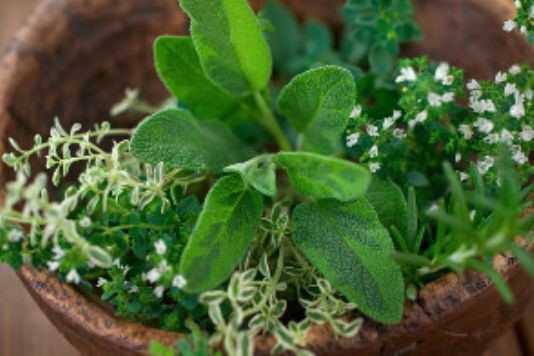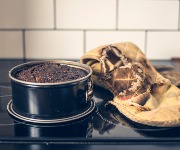What to do with leftover herbs

How to preserve leftover herbs to ensure they last that little bit longer.
I love fresh herbs, and use them in practically everything I cook. Above all else, I love the way they make my kitchen smell - truly, is there anything better than the scent of fresh rosemary or thyme lingering on your fingertips or wafting across your kitchen?
For one of my New Year’s Resolutions (and inspired by cook such as Nigel Slater who actively encourage you to ‘grow your own’), I'm looking to start cultivating a small herb garden in my exceedingly tiny backyard. But, until the time I can obtain some cuttings from my local garden centre to create the 'ultimate' kitchen garden, I tend to buy bits and bobs when I need them from my local grocer.
Whilst I will never grumble over the fact that I can buy a huge bunch of coriander from there for the paltry sum of 80p, I have been known to take my bounty home, pull it out of my shopping bag, and wonder out loud just what on earth I'm going to do with such a large amount of herbs. After all, I hate waste - and there is nothing more depressing than watching lovely fresh produce rotting away at the bottom of the fridge.
To counteract this problem, I’ve discovered that there are loads of ways you can preserve leftover herbs to ensure they last that little bit longer.
Drying herbs
It’s always useful to keep a few spare jars of dried herbs in your store cupboards to chuck into soups, stews, pasta sauces or one pot wonders such as this Grey Mullet with Mussels, Roasted Garlic and Oregano. Not only is drying your own herbs economical, but it also allows to create your own herb mixes which will be of a much better quality than anything you could get at the supermarket.
There are a number of ways to dry herbs. You can toast them gently in an oven or microwave – although do bear in mind that may cook your herbs, leading them to lose some of their flavour. The best method is to air dry them. It’s incredibly simple, and you can easily do it at home.
All you need to do is:
1) Remove any brown, shrivelled or dead leaves from your herbs.
2) Arrange them into small bunches, tie them up with string, and submerge them in boiling water for around 30 seconds.
3) Carefully pat the herbs dry with a paper towel – take care when you're doing this, as you don't want them to fall apart.
4) Wrap your herb bundles up in a medium sized paper bag which has a few holes punched into it, then tie this up with some string and leave it to hang up somewhere very warm and very dry. You will know that your herbs are ready when they become brittle, and crack slightly when you bend them.
Freezing herbs
Herbs like basil, coriander and mint can go mouldy very quickly due to their high water content. So, instead of drying them, try freezing them instead.
The best part about freezing herbs is that you can use them in exactly the same way that you would if they were fresh. The process of freezing herbs is remarkably easy. Whilst the leaves may start to look black and a bit limp, their flavour will remain perfectly preserved.
Coarser herbs, such as rosemary, and thyme, can easily be dry-frozen. All you need to do here is:
1) Strip the leaves from the stalks, and pack them into small plastic bags.
2) Squeeze as much of the air as you can out of the bag before putting them in the freezer.
Alternately, you can make dainty little herb ice cubes. Just chop the leaves up finely, put them into an ice cube tray, then fill them up with water. When you want to use them, just chuck them into whatever you're cooking. They're great for cocktails, or one pot recipes such as Moules Mariniere.
And there you have it - some foolproof methods to ensure that you never need to chuck out that horrible decrepit basil plant which is slowly wasting away on your windowsill ever again.
Also worth your attention:
Can eating herbs save your life?
Written by Christina McDermott
Most Recent
Comments
Be the first to comment
Do you want to comment on this article? You need to be signed in for this feature








